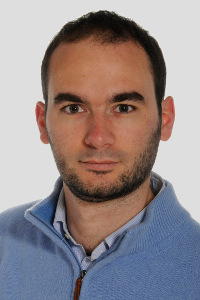DPG dissertation prize awarded to Jacopo Ghiglieri
News from Physics Department - 2012-03-14

The particle physicist Jacopo Ghiglieri has received the dissertation prize 2013 of the Deutsche Physikalische Gesellschaft (DPG). The three DPG divisions Gravitation and Relativity, Hadronic, Nuclear and Particle Physics award the dissertation prize for outstanding research in the framework of a PhD work and for excellent verbal and written presentation of the results. The award ceremony was held at the DPG spring meeting in Dresden on March 4, 2013.
Jacopo Ghiglieri’s thesis “Effective Field Theories for Heavy Quarkonium at Finite Temperature” was carried out in the group of Prof. Dr. Nora Brambilla at Physik-Department, Technische Universität München and at the Excellence Cluster Universe. He was the first PhD student of Prof. Brambilla at TUM. The work concentrates on the theoretical investigation of the quark-gluon plasma (QGP) formation in heavy ion collisions.
For a few millionths of a second after the Big Bang, the universe consisted of a hot soup of elementary particles called quarks and gluons. A few microseconds later, those particles began cooling to form protons and neutrons, the building blocks of matter.
Over the past decades, physicists around the world have been trying to re-create that soup, known as quark-gluon plasma, by slamming together nuclei of atoms with enough energy to produce trillion-degree temperatures. The existence of the quark-gluon plasma phase and its properties are key issues in the theory of strong interaction (QCD).
About 25 years ago it was conjectured that the interaction between a heavy quark and a heavy antiquark bound in a so called quarkonium system would be screened by the formation of a hot dense medium in heavy ion collisions, leading to quarkonium suppression as a privileged signal of QGP formation.
Today ongoing experiments at the Relativistic Heavy Ion Collider (RHIC) at Brookhaven National Laboratory and recently at the Large Hadron Collider (LHC) at CERN explore heavy ion collisions in an unprecedented energy window. To scrutinize the existing experimental data, solid and model independent tools are needed. In his thesis, Jacopo Ghiglieri for the first time formulates a theoretical framework, in which the quarkonium dynamics in a deconfined medium can be studied, at least in the situation of a small coupling constant. The theoretical methods used are based on effective field theories, which are the core competence of Prof. Dr. Nora Brambilla’s research group.
Contact
Prof. Dr. Nora Brambilla
Technische Universität München
Physik-Department T30f
James-Franck-Str. 1
85747 Garching
E-Mail: nora.brambilla@ph.tum.de
Tel.: +49 89 289 12353
Links
- Group of Prof. Nora Brambilla
- Announcement of the DPG (in German): Dissertationspreise 2013
- Press release Excellence Cluster Universe
- PhD thesis of Jacopo Ghiglieri: Effective Field Theories of QCD for Heavy Quarkonia at Finite Temperature
- Personal web pages of Jacopo Ghiglieri